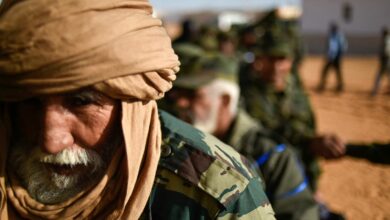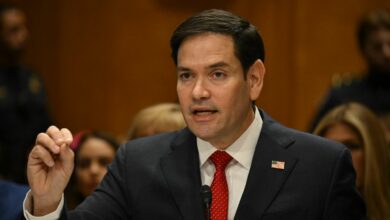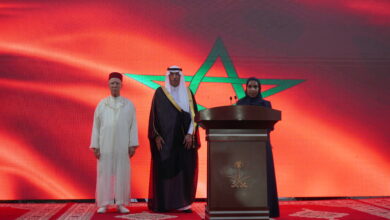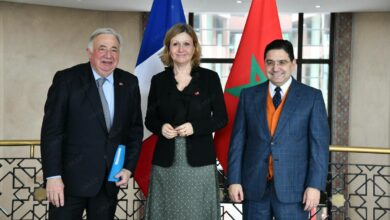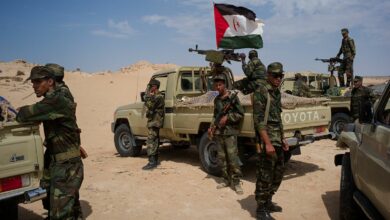France, Sahara, Algeria, Sahel, Palestine and Israel: Nasser Bourita in a Comprehensive Interview with Le Point
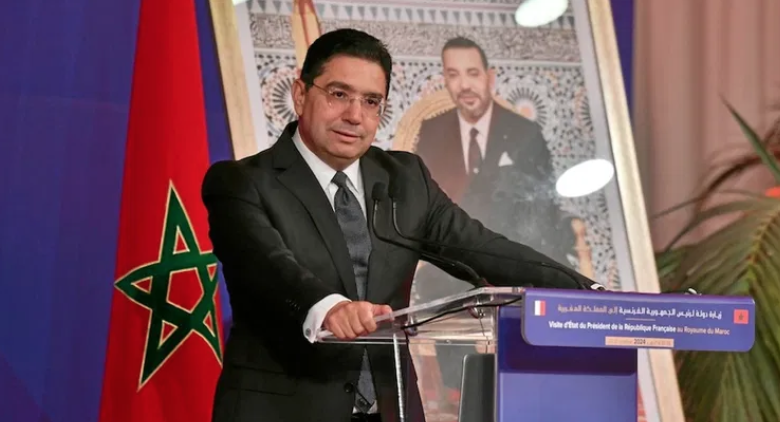
ALDAR/
Le Point conducted a comprehensive interview with Moroccan Foreign Minister Nasser Bourita on the sidelines of French President Emmanuel Macron’s official visit to Morocco. The discussion covered current issues, the Moroccan Sahara file, France’s recognition of Morocco’s sovereignty over its southern regions, and the historical period in Moroccan-French relations, as well as Morocco’s stance on Palestine and its relations with Israel. Minister Bourita presented the issues related to President Macron’s state visit to the kingdom following three years of diplomatic turbulence. Le Point confirmed that the extensive dialogue with Nasser Bourita lasted 45 minutes and did not shy away from any question. Below is the full text of the interview translated into Arabic:
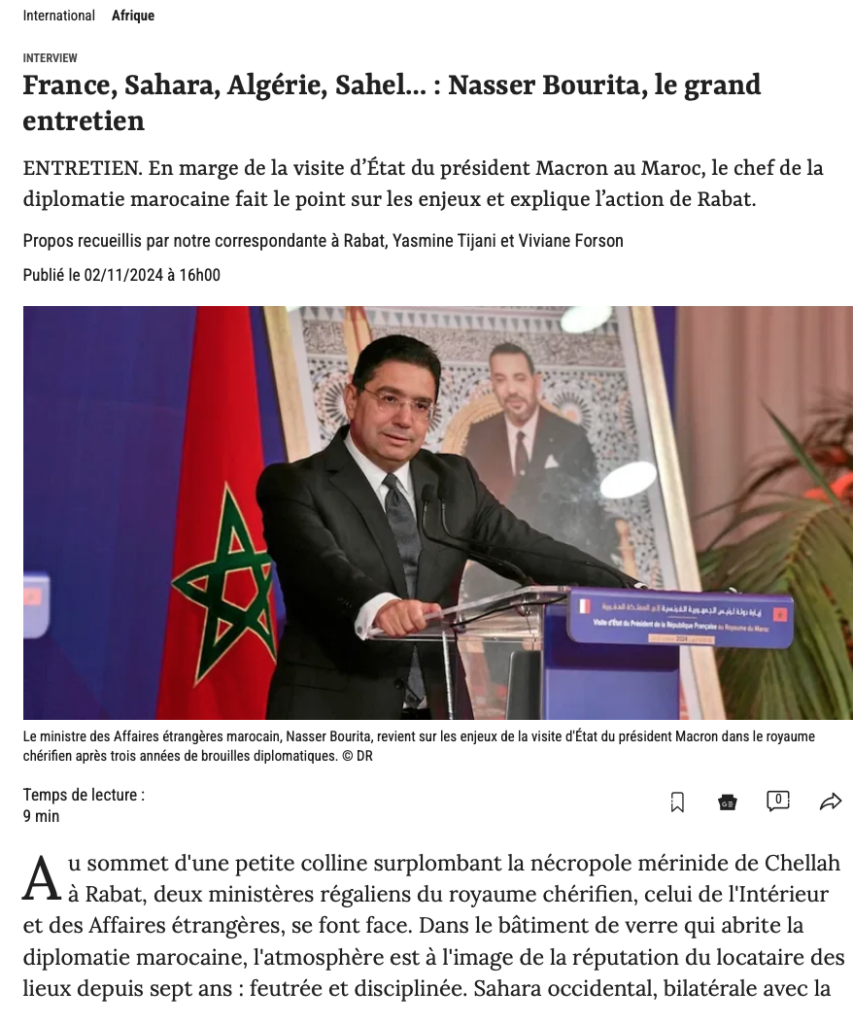
How do you evaluate the current state of diplomatic relations between Morocco and France, which many already consider “historical”?
This visit represents the beginning of a new chapter in relations between Morocco and France, as highlighted by His Majesty King Mohammed VI and French President Emmanuel Macron. It opens an official page marked by the signing of a significant declaration concerning the “exceptional partnership.” This document reflects a renewed ambition for bilateral cooperation, grounded in principles of equality between states, transparency, solidarity, and shared responsibility. It also outlines priority areas for collaboration—such as renewable energies, modernizing railway and port infrastructure—which are expected to serve as the foundation for a richer, mutually beneficial relationship.
This partnership is also governed by what has been established in the declaration: it will be overseen directly by the two heads of state, under the supervision of a committee tasked with devising innovative ways to leverage opportunities for enhancing this relationship in the long term.
The agreements signed in the presence of the king and the French president launch a new generation of commitments, reflecting a shared vision. This partnership relies on a genuine cooperative approach, which is “cooperation with Morocco,” built on working together while recognizing the true value of Moroccan enterprises. Leading partnerships, such as the high-speed train line and green hydrogen…
The Moroccan autonomy initiative has shifted from a “serious basis” fifteen years ago to the “only basis” today for Paris. What regional dynamics do you hope to promote thanks to this support?
The essence of the French position is its starting point: the present and future of the Sahara are linked to the framework of Moroccan sovereignty, as expressed in the letter from the French president to His Majesty the King on July 30. In other words, France affirms that the Sahara cannot be considered in isolation from this sovereignty. Regarding the resolution of this regional dispute, Paris believes that the autonomy plan proposed in 2007 is the only realistic and feasible basis for a political solution.
Today, all conditions are in place for progress: the autonomy initiative enjoys support from over 112 countries worldwide, including more than twenty countries from the Americas, among them the United States, and nearly three-quarters of African nations and EU member states. This international dynamic extends across all continents and regions.
However, a key element is missing: a responsible party to make progress towards a solution. The real player in this regional dispute prefers the status quo. This stagnation affects the security of the region and places a burden on the Maghreb, the Sahel, the Mediterranean coasts, and especially on the peoples of Morocco and Algeria.
How might the evolution of the French position on the Sahara issue affect the upcoming UN decision?
The French position aligns with a comprehensive dynamic initiated by His Majesty King Mohammed VI years ago, characterized by numerous explicit recognitions of Moroccan sovereignty over the Sahara, through the opening of nearly thirty consulates in Laayoune and Dakhla, and increased support for the autonomy plan as a solution to this regional dispute.
Within the European Union, around 20 out of 27 member states also support this initiative. The French position is significant: it comes from a permanent member of the UN Security Council, but also from a country that understands the realities of this region and is considered an influential player in the EU.
Furthermore, the UN Security Council resolution is presented by the United States as the principal drafter, and France seeks to work towards this position within multilateral institutions. Paris has already played an active role in drafting and discussing the resolution, which will be adopted this week, and we will see if new elements emerge.
In the context of your relations with France, what measures are you considering to facilitate the readmission of Moroccan citizens in an irregular situation?
Today, we seek to expedite the issuance of transit permits in coordination with French authorities to ensure the swift identification and facilitation of the return of irregular migrants. Following directives from Moroccan high authorities, consulates have been instructed to closely cooperate with police departments and improve this process.
With a well-integrated community of millions of Moroccans, including a majority of students and professionals in France, Morocco is keen to maintain this positive image. The French president has praised the success of Moroccans in various fields in France. However, there has never been a discussion about imposing conditions: individuals in an irregular situation identified as Moroccans will be repatriated without delay, in a spirit of shared responsibility and commitment.
How do Paris and Rabat view addressing migration challenges in the Mediterranean within the framework of their renewed partnership?
The issue of migration cannot be solved merely by pointing to transit, origin, or destination countries as solely responsible. The concept of shared responsibility is at the core of the royal vision: progress can only be made through genuine coordination and mutual commitment among different parties.
Take the example of unaccompanied minors. In 2018, His Majesty King Mohammed VI instructed to identify children who have family or can be accommodated in centers in Morocco. In June of the same year, a mission was sent to France to carry out identification; after four months, it was found that two-thirds of the 717 minors interviewed were not of Moroccan origin. However, even when Morocco wanted to return those of Moroccan origin, the process faced restrictions imposed by the juvenile judge, who prohibits the transfer of minors until they reach adulthood. This loophole, exploited by human trafficking networks, allows unreturnable minors to roam freely in Europe.
To enhance cooperation, a delegation of French judges was invited in October 2018 to visit child protection centers. Following the visit of the French judges, an action plan was adopted to organize the return of unaccompanied minors, within the framework of judicial cooperation between France and Morocco.
Given the importance of relations between France and Algeria, what measures do you expect from Paris to achieve better balance in its ties with the Maghreb?
Morocco does not interfere in the relationships that other countries have with Algeria. We focus exclusively on our bilateral relations with our partners, allowing each country the freedom to develop the ties it wishes with Algeria. This position is a clear and consistent doctrine of His Majesty the King. If Algeria considers strengthening our relationships with certain countries a threat, that is due to its interpretation. For us, we cannot link our relations with a state to its relations with another state. Our priority is to enhance our relations in line with our own interests.
How does Morocco plan to cooperate with France in the Sahel while maintaining its relationships with regional countries under the Atlantic initiative?
In his African approach, His Majesty King Mohammed VI has always rejected the view of the Sahel as a fatality. For this reason, he has visited Mali four times since 2012, invested heavily in training over 500 imams at the Mohammed VI Institute for Imam Training, and initiated numerous development projects, in addition to Moroccan presence in the banking and economic sector.
In this context, the royal initiative was launched, providing Sahel countries with access to Moroccan ports, storage areas, logistical infrastructure, fiber optics, and support in customs procedures.
The idea behind this initiative is to break the isolation of the Sahel and lift it from its state of closure. The responses to this royal initiative have been very positive: three ministerial meetings have already been organized, and working groups have been formed by the heads of the concerned countries to encourage the adoption of this initiative. A reference document has been prepared and will soon be presented to the heads of state for approval, with projects set to be launched in the short, medium, and long term.
France, also engaged in this region, seeks to achieve its goals, but with its own approach. The common objective remains the stability of the Sahel, with profound respect for the choices of its peoples and a strong commitment to enhance its development.
In light of pro-Palestine movements in Morocco, how does the government reconcile its cooperation with Israel and its support for the Palestinian cause?
Unlike the Middle East, our country has a Jewish heritage deeply rooted in its national identity. It is an inspiring model of coexistence where religion is not an obstacle. The resumption of diplomatic relations with Israel in 2020, under the trilateral agreement between Morocco, the United States, and Israel, does not mean support for the actions of the Israeli government. Morocco has vehemently condemned, at the highest levels, Israeli attacks on civilians, hospitals, and schools, deeming them unacceptable. His Majesty the King, as the head of the Al-Quds Committee, has reaffirmed his commitment to the Palestinian cause through direct communication with Palestinian Authority President Mahmoud Abbas on the same day relations were resumed with Israel.
It must be understood that this step does not mean abandoning the Palestinian cause; on the contrary. Morocco’s position on the Palestinian issue, which is, as His Majesty the King affirmed, a priority equal in importance to the Sahara issue, remains clear: this principled stance knows no concessions or silence; it is regularly expressed by the highest authority in the state.

